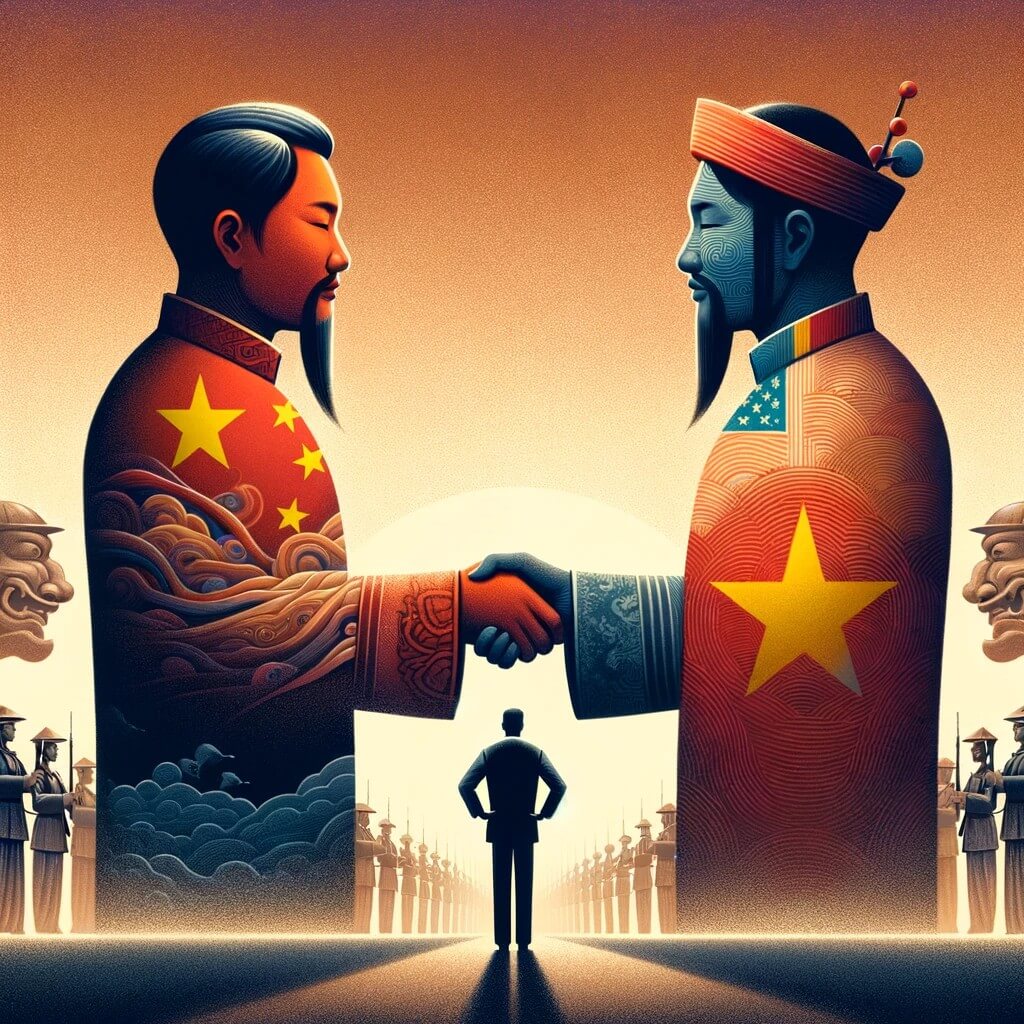China’s President Xi Jinping’s recent visit to Vietnam marks a significant moment in the relationship between the two Asian nations. Amidst the evolving geopolitical landscape, this visit signifies more than just a routine diplomatic exercise. It underscores a deepening bond between China and Vietnam, a development that holds substantial implications for the United States and its strategic interests in the region.
Diplomatic Chess Game
Xi’s journey to Vietnam, his first in six years, comes at a time when the United States is also vying for influence in Southeast Asia. This visit is more than just a neighborly handshake; it is a strategic move in the complex game of international diplomacy. As China and Vietnam, both with a history of conflict and cooperation, move towards closer ties, the United States finds itself observing a potentially shifting balance of power in the region.
This newfound camaraderie between Beijing and Hanoi is a dance of economic and security interests. With China being Vietnam’s largest trading partner and vice versa within the Association of Southeast Asian Nations (ASEAN), there’s more at stake than mere pleasantries. The commercial bonds between these nations are strengthening, with ASEAN recently surpassing the United States and the European Union as China’s largest trading partner.
A Tug of War for Influence
The United States, not to be sidelined, has been making its own overtures towards Vietnam. President Joe Biden’s visit to the country in September resulted in a “comprehensive strategic partnership” with Vietnam, a diplomatic upgrade that Vietnam had hesitated to initiate earlier, wary of Beijing’s reaction. This move was a masterstroke in Vietnam’s diplomatic playbook, balancing its relationships with both global powers.
China’s response to this U.S. maneuver is multifaceted. During his visit, Xi Jinping not only highlighted the strong trade and security ties but also pushed forward China’s global initiatives. These efforts are seen as attempts to counter the so-called U.S. “hegemony” and promote a multipolar world order.
The visit also had tangible outcomes, with expectations of signing numerous agreements in defense, trade, and other areas. This includes the construction of infrastructure projects under Beijing’s Belt and Road initiative, like the Hanoi Light Rail Line 2, and the promotion of cross-border transportation.
What’s particularly interesting is how both China and the United States are leveraging their historical and ideological ties with Vietnam. While the U.S. capitalizes on its recent strategic partnership, China is not shy to remind Vietnam of their shared communist roots and common interests in counterbalancing U.S. influence.
The undercurrents of this diplomatic engagement go beyond mere rhetoric. For China, strengthening ties with Vietnam also serves as a buffer against the increasing tensions in the South China Sea. For the U.S., deepening relations with Vietnam is part of a broader strategy to maintain influence in a region increasingly dominated by China.
A Balancing Act in a New Era
This evolving trilateral relationship among China, Vietnam, and the United States is emblematic of the changing dynamics in global politics. As Vietnam emerges as a crucial hub for manufacturers diversifying out of China, it gains a unique position in the global supply chain. This includes becoming a key destination for both Western companies looking to circumvent U.S. sanctions on Chinese goods and Chinese manufacturers seeking to mitigate geopolitical risks.
For the United States, the strengthening ties between China and Vietnam present both a challenge and an opportunity. While it might signify a need for recalibrated strategies in Southeast Asia, it also opens avenues for cooperation in a region that is increasingly vital for global economic and political stability.
As China continues to expand its influence through initiatives like the Belt and Road and Digital Silk Road, and as the United States seeks to solidify its presence in Southeast Asia, Vietnam’s role as a strategic partner becomes more pivotal. The dance of diplomacy continues, with each nation playing its part in this complex geopolitical ballet.





